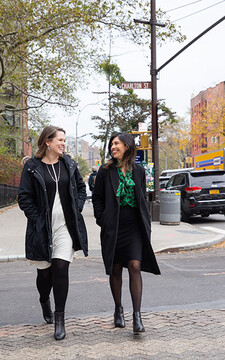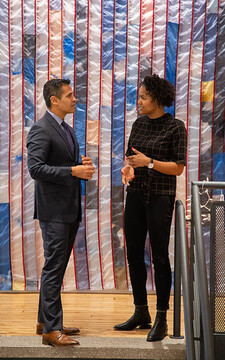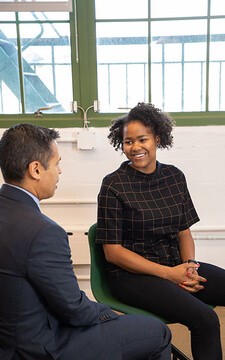The Power of People

The Yale Law School community consists of a network of more than 13,000 talented leaders and innovative minds that populate nearly every sector of society, from law and business to public interest and government. This remarkable group spans the globe, crosses generations, and has a rich diversity of backgrounds and interests. It is also a fantastic resource for YLS students and young graduates who can form meaningful and lasting relationships with experienced alumni, forging deep ties with benefits to both the mentor and mentee.
These connections have sprung up innumerable ways, from a serendipitous introduction at a Law School event to more deliberate outreach to someone who works at a dream employer. But regardless of how the initial spark is generated, it’s clear that when Yale Law School folks start talking, something magical happens.
Nick Turner ’96 says that his mentoring relationship with Erin Drake ’20 is a “joyful way to stay connected to the Law School.” Andrea Nill Sánchez ’14 counts on Katharine Huffman ’96 for advice on career opportunities and tries to channel the way she “leads with her humanity.” With each pair, it’s clear how much each person has learned from the other.
These stories are just two examples out of thousands that demonstrate the valuable bonds that take hold and flourish when a standing army of engaged alumni generously pay forward their time, wisdom, and experience in order to guide those beginning to chart their own course.
Katharine Huffman ’96 and Andrea Nill Sánchez ’14
After working at a law firm in the Bay Area, Andrea Nill Sánchez ’14 decided to return to doing the kind of advocacy work she felt passionate about. The bigger question was how to translate her legal education, experience, and network into the social justice sector during the next chapter of her career.
So when she joined The Raben Group, a majority-minority public affairs and strategic communications firm as a Director in its New York office in 2017, she reached out to Founding Principal Katharine Huffman ’96.

On a trip to Raben’s D.C. office, Nill Sánchez got in touch with Huffman, since she knew they shared an interest in the same types of justice reform issues.
“She, Joe Onek ’67, and Robert Raben were inspirations for me in terms of how they translated their legal experience into fulfilling advocacy work outside of the law,” Nill Sánchez said.
Soon, the two were in touch, often daily, and among other things talked about the practicalities of navigating a career transition from a law firm to advocating for public policy changes.
According to Nill Sánchez, “In the beginning, I came to Katharine for guidance on how to manage my recent transition from being a practicing lawyer to working at the intersection of policy, politics, and communications.”
Additionally, Huffman has served as a confidant and source of insight for any issues Nill Sánchez was facing.
“Sometimes we’ve talked about particular questions or situations she’s struggling with; but most of the time, I think the most important thing I’m doing is serving as a sounding board so Andrea has an extra vote of confidence behind her when she follows her own great instincts and creativity,” she said.
With time and career changes, their connection has continued to deepen, professionally and personally.
“We’ve moved from sharing and talking about purely substantive issues,” Huffman said, “to also talking through questions about professional development, juggling professional and personal responsibilities, and finding ways of productively pushing partners and colleagues (and ourselves!) to be creative, take smart risks, and do more.”
As Nill Sánchez advanced at The Raben Group, Huffman accepted an appointment as the executive director of the Square One Project at Columbia University’s Justice Lab, which aims to improve criminal justice policy nationwide.
The new position allowed Huffman to split her time between New York and D.C. (“conveniently for me!” Nill Sánchez said), and the two got the chance to work together on projects with the New York City Mayor’s Office of Criminal Justice and the Columbia Justice Lab.

“I think we’re both excited about the potential for our professional relationship to continue as [Nill Sánchez] dives in more deeply on these AI and technological issues,” Huffman said, “all of which have enormous implications for the civil rights and justice reform work we’ve done together for the past couple of years.”
And although they’re no longer working directly together, the two continue to stay in touch. Huffman and Nill Sánchez not only have their time at The Raben Group in common but also their affiliations in higher education.
“We’re now both leaders at organizations based out of major universities: Katharine focusing on criminal justice and me on the social implications of artificial intelligence — which means Katharine is someone I can count on to advise me on many of the opportunities and questions that come with the challenging work we do,” Nill Sánchez said.
A hallmark of their relationship has been the willingness of each to learn from the other.
“The relationship is definitely a two-way street,” Huffman said. “I’ve learned as much from her as she’s learned from me.”
For Nill Sánchez, their relationship has influenced the kind of leader she wants to be.
“Katharine leads with her humanity and that’s something I channel and try to do every day in my role,” she said. “She is also a multidimensional leader who is passionate about her career, family, and friends, enriching her interactions by bringing her full self to her work and the communities she serves.”
As both their professional lives overlapped and developed, Nill Sánchez continues to notice the impact of reaching out to Huffman for coffee several years ago.
“Working together on criminal justice issues has expanded the universe of possibilities of how we can use our law degrees — which has been exciting and liberating,” she said.
Nick Turner ’96 and Erin Drake ’20
Sometimes, a mentoring relationship can begin before law school even starts. At an admitted students’ program in 2017, Erin Drake ’20 met Nick Turner ’96, the President and Director of the Vera Institute of Justice, a nonprofit policy organization which seeks to improve the justice system.
The two were attending an annual Black Law Student Association (BLSA) brunch at the home of Walton Hale Hamilton Professor of Law Tracey Meares.

The two were introduced serendipitously in a corner of the living room, Drake recalled, and remained there for nearly the rest of the brunch.
“I was struck by Erin’s thoughtfulness as she considered the kind of environment she’d be happiest in as a law student,” Turner said. “While I hadn’t intended to give her a hard sell, it was pretty clear that YLS would be right for her, so I did.”
The encouragement worked, and Drake accepted her admission to the Law School soon after the brunch. She didn’t expect to speak to Turner again until the following year’s BLSA admitted students’ brunch, but during her first year of law school, Turner held a Vera Institute board of directors meeting at YLS, and he invited Drake to the dinner he was holding. There, she found herself meeting professors, authors, judges, and others she admired.
“The small space to speak with people whom I respect was great, but what mattered most was that Nick had pushed our relationship to grow,” she said. “That gave me the signal I needed to continue to invest in our relationship.”
Now in her 3L year, their informal mentoring relationship has deepened, and Drake and Turner discuss more than just the practical issues of navigating law school.
“What once was a question about law school or class selection is slowly but surely turning into conversations about the community of non-litigating lawyers he is in and I hope to be in,” Drake said.
Since their initial connection began organically over brunch, Drake and Turner said their relationship has a natural feeling that allows them both to be candid and honest with each other. “Some advice Nick gives me I don’t take,” Drake said. “The comfort lies in the ability to ask, however, and then to translate his experience and opinions into what works for me.”
For Turner, the naturalness of their relationship makes the term “mentor” seem undeserved.
“Frankly, I derive my own satisfaction hearing how a very talented, pensive, and kind student wrestles with law school life, decisions that feel so consequential at the time,” he said. “What firm, if any, is the right firm? What will this summer decision mean for me next summer? I think these decisions weigh a bit heavier for students of color, and it is rewarding to be able to lend some perspective and encourage Erin to make decisions based upon what moves and excites her.”

“Nick has asked himself and those around him many of the questions I grapple with today,” she said. “In a moment when I am learning what is possible with my law degree, observing someone like Nick in his professional and personal world has been a necessary reminder of what is possible beyond law school.”
She described Turner as a member of her “personal advisory board,” someone she can turn to who reminds her of the goals that led her to pursue law school in the first place. And he can impart advice about how he experienced many of the same law school situations Drake is currently navigating.
“Nick is an important person in my life not just because he answers my emails,” Drake said, “but because he lends me his perspective and shares his lived experience and subsequent reflections in order to aid me in my own decision-making process.”
For Turner, the mentorship connection is meaningful on many different levels, but he also describes it as “a really joyful way to stay connected to the Law School.”
“Inevitably our conversations transport me, and I spend the hours after we talk thinking about YLS, my friends, memories, and how it helped get me where I am now.”
As the two have formed a strong bond, it’s clear the conversation that started in Professor Meares’s living room won’t end once Drake graduates in May. Even though they will no longer need to consult about the intricacies of law school, their relationship will continue to evolve and grow as Drake embarks on her career.
“Nick has been there for me at every step of law school, and I believe he will continue to be as I close this chapter of my life and begin a new one,” she said.


